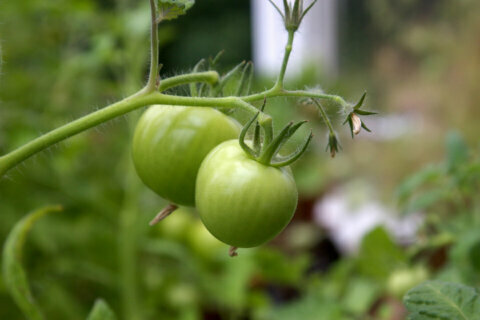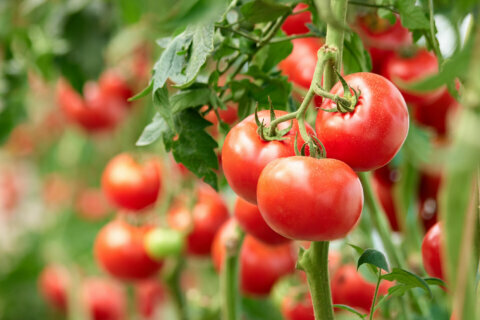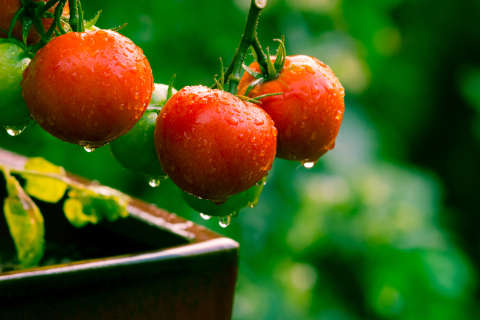Mike McGrath will appear in Rockville from 1 p.m. to 3 p.m. Saturday, Feb. 9 at the Community Home Show at the Universities at Shady Grove. More information is here.
Mike McGrath, wtop.com
Deal of the week: $10 off at Burpee
Burpee (technically “W. Atlee Burpee & Company”) may be one of the oldest seed and plant catalogs around, but it’s specialty is new introductions that are designed to dazzle — and this year they’ve outdone themselves with a pair of newbies that has the gardening world abuzz.
“On deck” is a new hybrid sweet corn designed to be grown — are you ready? — in a container! Sweet Corn! In a pot!
They say that nine or 10 seeds planted in a 24-inch pot will grow into 4- to 5-feet-tall stalks that should produce two or three medium sized ears each.
And their new “Super Sauce” is a seedless hybrid paste tomato that can grow individual fruits weighing up to two pounds apiece. That’s a big paster.
Burpee also offers heirloom varieties, grafted tomatoes (the hot new trend), flowers, fruits and other garden essentials.
And they’re offering WTOP listeners ten bucks off a $50 order of seeds, plants or supplies. Just use the special code “BXTEN”. You can shop online or request a print catalog at burpee.com or call them toll-free at 1-800-888- 1447.
Will spring bulbs be damaged by winter mood swings?
Cana in Bristow writes: “I planted my Daffodils, Tulips, Crocus and Snowdrops back in November, and it’s been so warm that they’ve been visibly growing ever since. I’m afraid of what will happen when and if we start having more of an actual winter — like frost, ice and snow. What do you suggest I do with all of these sprouting bulbs? I’ve tried talking to them, telling them to wait, but it doesn’t seem to be working.”
This is probably going to become more and more common if our climate continues on its current intense warming trend, Cana. But spring bulbs aren’t among the organisms at risk. These rugged plants have an inbred timing mechanism that keeps the flowers inside for a certain number of weeks, no matter what. And they contain a “natural antifreeze” that protects them from the most intense cold even following a warm week.
So don’t do anything more than talk. They can take care of themselves. It’s us I’m worried about.
Jagged marks on tree are made by rutting deer
Jim in Clifton writes: “I walked outside today and noticed a series of marks on our holly tree. They’re about 4 or 5 feet off the ground. (I’ve attached a photo). Who is chewing on the bark? The only thing I can think of is deer. Is that correct? If it continues, will it harm the tree?”
(Editor’s note: Photo above.)
I think you’ve identified the culprit but not the crime, Jim. The photo you sent shows marks that look more like gouges or wounds than bite marks. And that’s just about the right height for young male deer to be “velveting” their antlers. The racks on the heads of young bucks emerge with a fuzzy coating that the deer aggressively rub against trees, both to remove the fuzz and to leave their scent behind. And yes, repeating velveting can be harmful to trees.
So soak the trunk well with deer repellent, erect a temporary physical barrier of animal fencing or train a motion-activated sprinkler on the spot, just be sure to drain the water if and when temps drop below freezing.
Hard water is better for plants than soft
Bill in Stephenson writes: “We moved from Loudoun County to Frederick County last July and now have hard water. When Mother Nature doesn’t provide enough rain, will the hardness of the water coming from my sprinklers affect my lawn, shrubs or trees in any way?”
Yes Bill, and it’s all good. Hard water may be rough on your pipes, but its high mineral content is beneficial to plants, many of which suffer from mineral deficiencies. It’s water that’s been softened with added salts that’s bad for plants, especially lawn grasses, which can be very salt sensitive — particularly during the droughts that lead to watering.
So, you’re fine, but people with softened water should try to avoid using it on their lawns and gardens. Collected rainwater would be much safer.
Coffee grounds must be used carefully
Dave in Alexandria writes: “My boss has been collecting old coffee grounds from the office for about a month. I asked what he was using them for, and he told me he was adding them to his garden soil. I believe that you’ve said coffee grounds have no benefit when added to soil, but he swears that his azaleas, rhododendron and hostas thrive and do much better when the coffee grounds are added. Is it possible that the grounds do benefit these types of plants? And is there any benefit when coffee grounds are added to compost?”
Coffee grounds are very acidic and very high in Nitrogen, the primary plant food. So yes, if they’re added at the correct time of year, they will benefit acid-loving plants like azaleas and rhododendrons. But timing is crucial. He shouldn’t apply coffee grounds over the summer, when these spring-blooming plants are setting the following year’s flowers, as nitrogen can depress flower production. High-nitrogen plant foods like coffee grounds and barnyard manures produce big plants but fewer fruits and flowers.
And he shouldn’t use coffee grounds on “normal” plants (ones that like to grow in soil with a fairly neutral pH), especially if his soil is already on the acidic side, as most D.C.-area soils are. That includes hostas, which are weeds that need no feeding.
And compost? Yes, yes, yes! Probably the best and safest use for coffee grounds is to be mixed in with lots of well-shredded leaves. That combination will make the finest finished compost.
Follow @WTOPLiving on Twitter.
(Copyright 2013 by WTOP. All Rights Reserved.)







